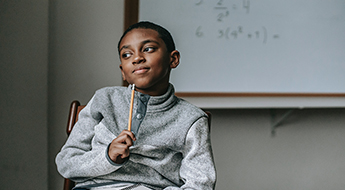Onnie Rogers
Associate Professor of Psychology and of Education and Social Policy (by courtesy)
PhD, New York University, 2012
Onnie Rogers is a developmental psychologist whose research curiosities converge at the intersection of psychology, human development, and education. She is interested in social and educational inequities and the mechanisms through which macro-level disparities are both perpetuated and disrupted at the micro-level of identities and relationships. Rogers directs the Development of Identities in Cultural Environments (DICE) research lab, where they conduct research on identity development among racial and gender diverse children and adolescents in sociocultural and educational contexts. She asks how our social groups—and the cultural ideologies and stereotypes that accompany them—shape how we see ourselves and interact with others.
Rogers is a member of the Society for Research on Child Development, Society for Research on Adolescence, and American Educational Research Association. She was a National Science Foundation (NSF) postdoctoral fellow and has received postdoctoral fellowships from the Spencer Foundation/National Academy of Education and the Ford Foundation. She has received research fellowships and grants from groups including The Alliance for Research in Chicagoland Communities (ARCC) and the Northwestern University Women's Center. Her research has been published in scholarly journals, including Child Development, Journal of Adolescent Research, and Cultural Diversity and Ethnic Minority Psychology, in addition to invited edited volumes about child development and identity. She is an associate editor for the Journal of Adolescent Research.
She received her PhD in developmental psychology from New York University’s Steinhardt School of Culture, Education, and Human Development and holds a BA in psychology and educational studies from the University of California, Los Angeles (UCLA).
Current Research
Black Girls’ Development. “Black Girl Magic”: The Social and Academic Lives of Black Girls was a longitudinal study investigating the social and academic experiences and development of Black adolescent girls attending academic programs designed specifically for Black girls in Chicago and St. Louis. The guiding question for this project was: How do cultural stereotypes and messages, school, and community contexts influence how Black adolescent girls see themselves, their relationships, and their futures? A central focus of this work is to identify the strategies that Black girls use as they negotiate society’s expectations about who and what they are and can become and how spaces designed for Black girls support them in this process. With three years of data collection complete, ongoing analyses focus on the needs and strengths of Black girls, the value of Black girl spaces, and strategies needed to support the social and academic development of adolescent girls. This work has grown to include a community-research partnership funded through the Alliance for Research in Chicagoland Communities (ARCC), with Gloria Dotson-Lewis (MSW), founder of Distinctively Me, a non-profit serving adolescent Black girls. Rogers and Dotson-Lewis established the Rebuilding Black Girlhood community advisory board and developed a program designed to nurture healthy relationships and identities among middle-school Black girls.
Multiple Identities and Intersectionality in the Sociopolitical Context. Much of the research on identity focuses exclusively on adolescents, though we know that social group attitudes and identities emerge in middle childhood (around 8 years old). Through an in-depth, qualitative analysis, Rogers continues to explore the foundations of identity development by analyzing how children and adolescents speak about and make sense of social groups, including race, gender, academics, and athletics, as well as broadening to understand multiracial and gender diverse identities among youth and college students. We consider how the sociopolitical events, such as Black Lives Matter, intimately shape the identity experiences and developmental pathways of young people. Our projects privilege qualitative methodologies and critical epistemologies to center the lived experiences and meaning-making of young people across contexts and positionalities.
Children’s Learning about Race and Racism. In this line of my research, I consider the ways that socializing agents—parents, teachers, and media—create opportunities or barriers to children’s developing understanding of race, racism, anti-racism, and their own racial identities. The On Parenting About Race (On PAR) study is a collaboration with Andrew Meltzoff (University of Washington) and David Chae (Tulane University), in which we are exploring how parents talk about race and racism with their children. We sampled nearly 800 Black and white parents in the months following the racial upheaval of summer 2020, which included the highly public and visible murders of Black people, including George Floyd and Breonna Taylor. With qualitative and quantitative data and interviews, this research is designed to understand how moments of sociopolitical change shape developmental processes and offer opportunities for transformation. In another collaboration with Chae and colleagues, we are conducting a three-phase study to design and develop an app-based intervention to encourage "Color Brave” race conversations among parents of young children. In collaboration with IPR Fellows Terri Sabol and Sandra Waxman, we are focusing on classrooms and teachers as a site for children’s racial development. This collaboration is focused on developing the research tools and measures we need to meaningfully assess race happenings in preschool classrooms, so we are better positioned to disrupt the all-to-normal everyday racism that undergirds education.
Implicit and Explicit Identities. As a psychological process, much of the “work” of identity development occurs unconsciously or implicitly as one responds to the stereotypes, norms, and expectations of a social group. Rogers’ research works across methodological approaches to explore both the explicit (what youth say) and the implicit (what they think) underpinnings of identity. With Dario Cevencek and Andrew Metlzoff of the University of Washington, she developed an Implicit Associations Test for a diverse sample of children to investigate the link between implicit and explicit measures of children’s racial and gender identities and endorsement of racial and gender stereotypes. This work examines the link between implicit measures of multiple identities and children’s academic engagement and school performance.
Selected Publications
Jones, C. and L.O. Rogers. 2022. “There are stereotypes for everything”: Multiracial adolescents navigating racial identity under White supremacy. Social Sciences 11:19.
Moffitt, U. and L.O. Rogers. 2022. Studying ethnic-racial identity among White youth: White supremacy as a developmental context. Journal of Research on Adolescence 32(3): 815–28.
Rogers, L.O., E. Niwa, K. Chung, T. Yip, and D. Chae. 2021. M(ai)cro: Centering the macrosystem in human development. Human Development 65:270–92.
Rogers, L.O., and N. Way. 2021. Child development in ideological context: Through the lens of resistance and accommodation. Child Development Perspectives 15(4): 242–48.
Rogers, L.O., D. Mastro, and M. Robb. 2021. The inclusion imperative: Why representations of race and ethnicity matter in kids' media. Common Sense Media.
Rogers, L.O., H. Versey, and J. Cielto. 2021. “They’re always gonna notice my natural hair”: Identity, intersectionality and resistance among Black girls. Qualitative Psychology.
Rogers, L.O., U. Moffitt, and C. Foo. 2021. “Martin Luther King fixed it”: Children making sense of racial identity in a colorblind society. Child Development 92:1817–35.
Rogers, L.O., R. Rosario, D. Padilla, and C. Foo. 2021. “[I]t’s hard because it’s the cops that are killing us for stupid stuff”: Developing racial identity in the context of Black Lives Matter. Developmental Psychology 57(1): 87–101.


